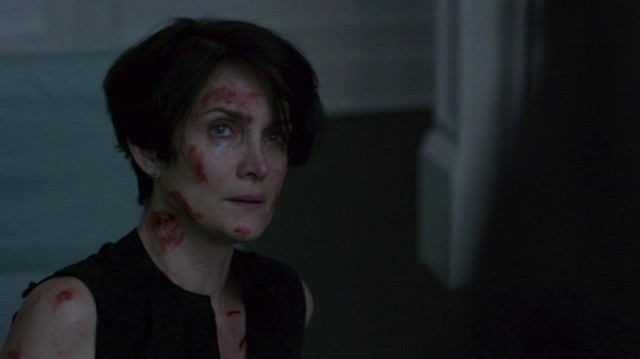
Hello, and welcome to the last four episodes of Jessica Jones! It’s been quite a ride so far. This review is going to be a mixture of my thoughts on the first nine episodes and this tenth episode. I will say that a lot of my focus in this review is about all the previous episodes as a whole, with more than enough tenth episode commentary in there, too.
Jessica Jones is good. It’s really, really good, and occasionally, it’s even great. There are moments when this show feels as innovative and as powerful as any show on television, with a cast of characters that feel as if not more real than anything else we’ve seen. It explores many feminist issues with depth (something that I really appreciate and enjoy, personally), and does a good job turning abuser/abused dynamic into a coherent storyline that is both an enjoyable narrative and thoughtful exploration. A B+ first nine episodes, I think.
But.
The stumbles of Jessica Jones are not in the acting, or the themes, or the direction. The stumbles are in the writing, especially when it comes to character. I won’t skip ahead, but even confining my complaints to the parameter of this episode, I can safely say that I am concerned about Malcolm, Will Simpson, and Wendy.
I don’t want to address this in the actual review, so I’ll put my problems with Malcolm here, and get them over with:
Malcolm is an issue for me because of the way he was introduced. He was introduced as a part of Jessica’s life, comfortable enough for her to be only mildly annoyed that he had wandered into the wrong kitchen and started eating her peanut butter. The implication is that he has done this before. The way the scene is written makes them out to be much closer friends than the show itself does. We’re expected to believe that they are friends and that is that. Cool. Great. We’re starting in media res with that relationship, and I’m fine with that. But there is just nothing there. No closeness, no warmth, no reason for them to be friendly at all. Perhaps I am missing something, but there is nothing connecting Malcolm to Jessica or Jessica to Malcolm, at least in terms of friendship. I don’t buy he and Jessica together, is what I’m trying to say.
Now that I sound like a complete and utter lunatic, we can really get down to business.
* * *
Right off the bat: I gave this episode of Jessica Jones a seven out of ten stars, which equates to a solid B in my mind. This is a drop from my initial thoughts and notes on the episode, which had it at a B+.
My main complaint with this episode deals with the characters of Simpson and Wendy. I don’t think that I am going out on a limb here to say that these two characters are the least developed or fleshed out of any of the characters on Jessica Jones. With Wendy I can understand a little bit more, as she’s nothing more than prod for Hogarth and the filling in of her character than she is a real character herself, but Simpson is a part of the main cast. Simpson comes into the show as someone who is also damaged by Kilgrave, and then bonds with Trish and eventually becomes her lover. I thought the show was going to use him as a way to explore the male victims of abuse, but instead it went full in the other direction. Simpson is, by this episode, a sociopath. He takes those red pills and goes to the Kilgrave Cage and shoots Detective Cleamons in the forehead. He’s gone full dark side, and there is no coming back for him.
I’d call it a character break, but you have to have an established character to break first. Simpson is all over the map in the course of the first ten episodes of Jessica Jones, and his stunning and far too quick full heel turn almost derails the show for me. It’s such a big change that I really struggled to get over it. I’m not explaining it well in this space because, frankly, I don’t even know how to explain it coherently.
In the comics, Will Simpson was a villain named Nuke who took pills that turned him into a crazy person. The Jessica Jones writers are obviously interested in using him both in this show and the wider Marvel universe, or else they wouldn’t have spent so much time on him. But they didn’t take the time they should’ve to get him to that point. Turning him bad can be done in one season, and it can be done in such a way that feels natural and organic. But his turn now, after previous character changes, only serves to muddy up the narrative of this episode and the show beyond.
Wendy’s issue is exactly what I already said: she only exists to reveal the depth of Hogarth. A lot of time was spent on that divorce arc, and it ends with Pam killing Wendy on the side of a coffee table in self-defense. Wendy’s character was never revealed; the only time we saw her outside of Hogarth was when Jessica went to blackmail her into helping her out. Hogarth has truly fallen in love with her secretary, but what is it about her secretary that she doesn’t see in Wendy anymore? Their divorce problems serve as B and C plots to fill time in episodes, and the series wrap up that plot in this episode when the main story becomes big enough to carry the last three and a half episodes.
I’m a little salty about this too because the actor who played Wendy is Robin Weigart, who is most famous for her role as Calamity Jane in the fantastic HBO show Deadwood. When I saw that she was playing Wendy, I had high hopes for her character, and Jessica Jones did essentially nothing with her. That is almost unforgivable. Why even get an actress of this caliber just to have her be the nagging wife?
* * *
And yet, I enjoyed this episode.
I think a lot of it has to do with Hope. Hope was a character that I really enjoyed, and really hoped would make the main cast. Now that she’s out of prison, she’s going to have more to do, I thought. Her jabbing that piece of glass in her neck to motivate Jessica into murdering Kilgrave was a really powerful moment for me.
Too often in shows like these, characters who are forced to do something that they don’t want to do are left in the cold. Someone in Supernatural gets possessed and they kill someone, they’re just screwed, because the boys can’t do anything about it. They’re going to jail no matter what. I was really happy when I realized that Hope wouldn’t be forgotten; instead of being a stain on Jessica’s conscience, we were forced to deal with her fate in every episode. That means something to me.
And it doesn’t hurt, too, that Erin Moriarty plays her so well. She wasn’t given a ton to do, but she was, she was very, very good. I thought her recovering from her own abuse and pain without the virtue of having super powers like Jessica would’ve been a welcome addition to the story, but alas.
For all the complaining I did about Wendy, I do enjoy Hogarth as a character. She’s been portrayed as, at best, morally gray for the entire season, but it was during this episode that she was revealed as what she really is: an abuser. The fact that she would allow Kilgrave to go free just to get her divorced papers signed is one of the most evil and cruel things I can imagine. It’s so mundane and stupid and unambitious that it really fleshes out how close she and Kilgrave are to being the same person. Kilgrave, as I read in another review, could be the President of the United State— but instead, he focuses all of his considerable power on one person. Hogarth takes the power of Kilgrave and uses it not to advance in her firm or start her own or become the richest, most powerful woman in New York: she uses it to force the ex-wife she cheated on and verbally abused into signing her divorce papers in a way that is favorable to her. I mean, holy hell.
* * *
I’m going to finish this first review by taking about Jessica and Kilgrave, and skip over Trish. It’s not because I think Trish is an inferior character (she’s probably my favorite on the show), but because I’m at 1400 words and Trish has a lot of interesting stuff upcoming. I just wanted to make that clear.
* * *
I have issues with the Jessica Jones character. I think the show tries too hard to make her seem tortured and broken, and it bogs down some parts of the story. The continuous shots of Wild Turkey have begun to feel less like an exploration of a fractured psyche and more and more like product placement instead of product integration.
But to be totally frank: who gives a damn, because Krysten Ritter is so amazing in this role. She inhabits this role so fully that I’m surprised that she’s every played anyone else. I thought she was great on Breaking Bad, and was the only good thing about Don’t Trust the B, but this is on a whole other level. Jessica Jones is not Jessica Jones without Krysten Ritter; any other actor in this role probably fails.
Every time Jessica Jones goes overboard to make Jessica seem so hard and cold, there is a little vulnerability and fear that Ritter projects that just draws me back in. Her line delivery and body language save many of those moments and turn them into something much more meaningful. If she isn’t nominated for an Emmy, then I don’t know what Emmy voters want. Her performance in this episode is especially good; her emotional scene with Hope as Hope bleeds out in Jessica’s arms was really, really good.
But as fantastic and engaging as Ritter is as Jessica, David Tennant takes Kilgrave one step further. He is an evil, sadistic, rapist douchebag, but the charm and the vibrancy that Tennant brings to the role make what could be a one-note villain into something much more. Even in this episode, as he captures Hope and makes the support group step to the edge of the bar, he pulls you in. There were too many times where I caught myself wanting him to become a good guy, even as the support group stepped off the bar and began to hang themselves.
Probably my favorite part of this entire episode was the discussion of perception between Kilgrave and Jessica. Kilgrave remembers a time when Jessica stayed with him even with the mind control having worn off; he says for 18 seconds, she chose to be with him. But Jessica doesn’t remember it that way; she remembers trying to escape, and Kilgrave having her cut her ear before stopping her.
It really spoke to the depravity and the complete obliviousness of the world that Kilgrave lives in. He really has constructed this narrative in his head, so totally and completely, that Jessica really does love him. But the interesting thing is, when she confronts him with the real events, he doesn’t even seem surprised. He gets angry, and just brushes past it.
But that scene got me to thinking: what if she really had been into him for those 18 seconds? I’m not saying that as a way of defending Kilgrave’s version of events, but as a way of maybe deepening the abused/abuser dynamic. Many times, the abused stay in relationships by latching onto the few moments when they and their partner are actually having a good time; what if Jessica had perhaps given in at that moment, and really did enjoy herself, despite everything that had happened to her? What would that do for her character? That’s not to say that Kilgrave’s abuse wasn’t abuse or that it somehow invalidated Jessica’s desire to leave or anything like that; it just would’ve added another layer to that abused/abuser dynamic that Jessica Jones explored and deconstructed.
But anyways.
* * *
And so we march on, to Episode 11.
[Photo via Netflix]
 Follow Us
Follow Us




